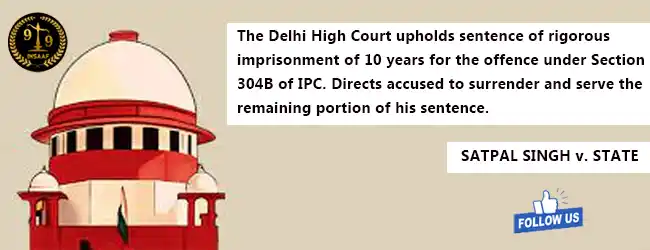2023-Dec-07

The Delhi High Court has upheld the sentence of rigorous imprisonment of 10 years for the offence under Section 304B of IPC and rigorous imprisonment of 3 years for the offence under Section 498A, along with fine of Rs.10,000. Since the appeal was filed in 2009 and the husband was on bail for more than 14 years, the court directed that he shall surrender to serve the unexpired portion of his sentence within a period of 30 days.
The accused husband had filed an appeal under Section 374 read with Section 482 of the Code of Criminal Procedure, 1973 impugning judgment of conviction and order on sentence dated 16.04.2009 and 21.04.2009 respectively passed by learned Additional Sessions Judge, Rohini, Delhi in case FIR bearing no. 180/2000 registered at Police Station Prashant Vihar for offence punishable under Section 498A/304B/34 of Indian Penal Code, 1860.
The Brief facts leading to the case are that the accused husband got married to the deceased on 28.03.1999 and a girl child was born out of the wedlock. However the bride committed suicide on 31.05.2000 and according to the prosecution, as per the statements of the parents of the deceased she was being subjected to harassment for non-fulfilment of dowry demands. The father of the deceased had also informed the police that earlier also, a report had been lodged with the Crime Against Women Cell by the complainant and there a compromise had taken place and the deceased had been taken back to her matrimonial home by the appellant after giving assurance that he will not repeat acts of torture and harassment in future, however, the harassment had continued.
The Trial Court had acquitted appellant’s sister and brother and had convicted the appellant herein under Sections 498A/304B of IPC. By way of impugned order on sentence dated 21.04.2009, learned Trial Court had convicted the appellant to undergo rigorous imprisonment of 10 years for offence punishable under Section 304B of IPC and rigorous imprisonment of 3 years for offence punishable under Section 498A of IPC, along with fine of Rs.10, 000/- and to undergo simple imprisonment of 6 months in case of default thereof. Aggrieved by the aforesaid, appellant had filed the appeal before the High Court. The appeal was admitted on 19.05.2009 and the sentence of appellant was suspended on 13.07.2009.
The High Court held thus:
“The only "offence" of the deceased was that she was married to the appellant whose overpowering greed had shadowed the basic humanity, respect, love that a human being should have towards another human being. Even the minimum respect and love expected within a matrimonial relationship was missing as is reflected from the testimonies of the witnesses, that the deceased was not only beaten but was also threatened that he will get married to another woman while being married to her in case, he does not get cash of Rs.5 lakhs etc. from her parents. It was a blackmail and physical abuse unpardonable.”
“This Court, in view of the aforesaid discussions, is of the opinion that victim's suicide was a tragic outcome of the profound distress she experienced in her marital home, stemming from the relentless cruelty and harassment inflicted upon her by her in-laws. The case at hand also presents a tragedy, wherein the continuous demands of dowry made by the appellant pushed the deceased into a despair so profound that she felt compelled to take her own life. This serves as a reminder of how the forces of greed can often eclipse the sanctity of human life and the bonds of matrimony. The collective experience of victims of dowry death, as narrated through their near ones after their demise as also visible in the present case, lays bare the excruciating psychological trauma that women endure when subjected to dowry demands which mean that even after being married, they are forced and expected to keep asking their parents and families to somehow give cash or other expensive articles to the husband or his family as a matter of their right only because they are parents of a boy and the parents of a girl are duty bound to fulfill such demands of theirs.”
What can the Legal Experts do for you? Our team of lawyers is ready to help you in minutes with any legal question.
 Whatsapp
Whatsapp
 Toll Free :-
1800-212-9001
Toll Free :-
1800-212-9001